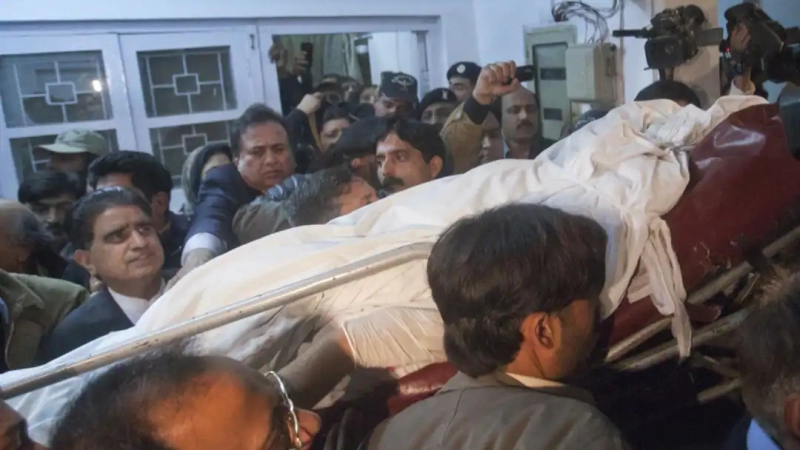By Amanda Hodge
IT says much about Pakistan’s McCarthyist atmosphere that the television presenter whom many accuse of inciting the political assassinations rocking the country is being promoted as “Pakistan’s most dangerous anchor”.
Her now infamous interview was recorded weeks before the assassination, in January, of Punjab governor Salman Taseer.
Meher Bokhari – one of Pakistan’s new breed of firebrand, ratings-driven anchors – accused the moderate politician of being anti-Islam for trying to reform the country’s blasphemy laws.
She wasn’t alone, but in Pakistan one such accusation can be a death sentence and so it proved to be.
On the day of Taseer’s funeral she once again made headlines by posing the question of whether Taseer’s killer was hero or villain.
Although Bokhari left her job in the scandal that followed she was quickly picked up by a rival channel only too pleased to capitalise on her deadly reputation.
“Take her on if you dare,” the new channel seems to suggest, and as the bodies of Liberal activists begin to pile up in Pakistan it seems fewer are willing to do so.
With the murder last week of minority affairs minister Shahbaz Bhatti, Pakistan lost its only Christian cabinet minister and one of only three federal politicians prepared to publicly lobby for reform of the draconian blasphemy laws, which have become a deadly tool for settling scores and targeting minority populations.
Taseer was another, and the third – former Benazir Bhutto confidante Sherry Rehman – is said to receive fresh death threats every half hour. The question now is: will anyone be prepared to step into that void?
“There’s an Islamist purge under way and politicians are afraid they will lose their lives,” says columnist Raza Rumi who, like many outspoken Pakistani liberals, has faced his own trial by media.
One Lahore-based journalist described the current oppressive atmosphere in his once liberal artsy city as a witch hunt in which everyone was under suspicion.
Rumi gloomily predicts things will get worse before Pakistan’s security establishment – the real power in the nuclear-armed nation – feels sufficiently threatened, as it did in the Swat Valley in 2009, to suppress the growing militancy.
Then, Pakistan’s civilian government was forced to mobilise troops against a self-made Taliban leader who broke a series of deals, essentially ceding the prized Swat Valley to his draconian leadership.
But in the hours after Bhatti’s bloody assassination by three Taliban gunmen, among the most poignant, angry observations came from Taseer’s Indian-based writer son, Aatish.
“What has happened with Shahbaz Bhatti is a shameful indictment of Pakistan’s political class and their response to my father’s assassination,” he wrote.
“They sat back and watched as his killer was deified; they turned their back on any effort to amend the blasphemy laws; they allowed the Senate to throw out a motion even to condemn his killing.
“They thought that if they did nothing it would all just go away; but it hasn’t gone away and it now turns out there is a heavy price to pay for that kind of criminal weakness.”
Pakistan’s Christian church leaders also reacted with unaccustomed bluntness this week, warning that the country would become a “killing field of the democrat and liberal individuals” if the government did not act to protect its citizens.
Despite its current reputation in the West for Islamic extremism, Pakistan has long been seen in the Muslim world as a nation of moderates with an ancient tradition of mystical Sufiism.
In the absence of a balanced, countering voice from government, the preservation of the country’s blasphemy laws has proved a remarkably effective rallying call for hardline clerics, says Marvi Sirmed.
The democracy and human rights activist was herself the subject of a motion in parliament last month, which sought to have her declared a blasphemer for her campaign to have Taseer declared a martyr.
The motion failed but the message was clear. If you are not with us, you are against us.



